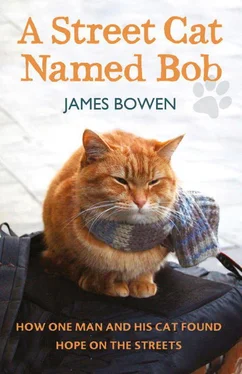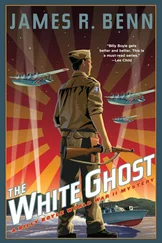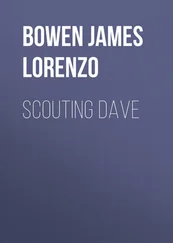‘Here you go, Bob,’ she said, stroking him on the back of the neck as she placed the bowl in front of him. ‘Don’t want you getting dehydrated now, do we?’ she said.
He wasted no time in diving in and lapped it up in no time whatsoever.
Bob had always had this ability to endear himself to people, but it never ceased to amaze me just how many seemed to become devoted to him. He had won the Islington crowd over in a matter of weeks. It was amazing really.
Of course, it wasn’t perfect at the Angel. This was London after all. It could never have been all sweetness and light. The biggest problem was the concentration of people working the area around the tube station.
Unlike Covent Garden where all the surrounding streets were alive with activity, at the Angel things tended to be concentrated around the tube. So as a result there were a lot of other people operating on the streets, from people dishing out free magazines to charity workers – or ‘chuggers’, as they were known.
This was one of the biggest changes that I’d noticed since I’d started working on the streets a decade earlier. The streets were very much more competitive than they used to be. The ‘chuggers’ were mostly hyper-enthusiastic young people working for charities. Their job was to collar well-heeled commuters and tourists and get them to listen to a spiel about their charity. They would then try to persuade them to sign up for direct debits to be taken from their bank accounts. It was like being mugged by a charity – hence their nickname: chuggers.
Some were third world charities others were health related, to do with cancer or other illnesses like cystic fibrosis and Alzheimer’s. I didn’t have a problem with them being there but it was the way they hassled people that annoyed me. I had my own sales spiel for the Big Issue , of course. But I wasn’t as intrusive or as nagging as some of these. They would follow people down the road engaging them in conversations they didn’t want to have.
As a result of this, I would see people emerge from the tube station, see a wall of these enthusiastic canvassers, usually in their loud coloured T-shirts, and make a run for it. A lot of them were potential Big Issue buyers so it was very annoying.
If someone was really driving people away I would have a word. Some of the canvassers were fine about it. They respected me and gave me my space. But others didn’t.
One day I got into a heated argument with a young student with a mop of Marc Bolan-like curls. He’d been really irritating people by bouncing around and walking alongside them as they tried to get away. I decided to have a word.
‘Hey, mate, you’re making life difficult for the rest of us who are working here,’ I said, trying to be civil about it. ‘Can you just move along the road a few yards and give us some space?’
He’d got really antsy about it. ‘I’ve got every right to be here,’ he said. ‘You can’t tell me what to do and I will do what I want.’
If you want to get someone’s back up, you just need to say something like that. So I put him straight on the fact that while he was trying to make pocket money to fund his ‘gap year’, I was trying to make money to pay for my electricity and gas and to keep a roof over my and Bob’s head.
His face kind of sank when I put it in those terms.
The other people who were a real irritant for me were the people who sold the assorted free magazines that were being published now. Some of them – like StyleList and ShortList – were actually good-quality magazines, so they caused me no end of problems, the simplest of which boiled down to a question: why were people going to pay for my magazine when they could get a free one from these people?
So whenever one strayed into my area I’d try to explain it to them. I’d say to them straight up: ‘We all need to work, so you need to give me some space to do my job, you need to be at least twenty feet away.’ It didn’t always work, however, often because a lot of the vendors who sold these magazines didn’t speak English. I would try to explain the situation to them but they didn’t understand what I was trying to say to them. Others simply didn’t want to listen to my complaints.
By far the most annoying people to work the streets around me, however, were the bucket rattlers: the charity workers who would turn up with large plastic buckets collecting for the latest cause.
Again, I sympathised with a lot of the things for which they were trying to raise money: Africa, environmental issues, animal rights. They were all great, worthwhile charities. But if the stories I had heard about how much of the money disappeared into the pockets of some of these bucket shakers were true, I didn’t have much sympathy. A lot of them didn’t have licences or any kind of meaningful accreditation. If you looked at the laminated badges around their necks, they could have been something from a kid’s birthday party. They looked amateurish.
Yet, despite this, they were allowed inside the tube stations, a place that was an absolute no-go zone for a Big Issue seller. It would really nark me when I saw a bucket rattler inside the concourse hassling people. Sometimes they would be standing right up against the turnstiles. By the time they emerged out of the station the commuters and visitors were usually in no mood to be persuaded to buy the Big Issue .
It was, I suppose, a bit of a reversal of roles. In Covent Garden I had been the maverick who hadn’t stuck to the designated areas and bent the laws a bit. Now I was on the receiving end of that.
I was the only licensed vendor in the area outside the tube station. And I’d worked out the areas that I could and couldn’t stray into with the other main sellers there – the newspaper vendor and the florist in particular. The chuggers, hawkers and bucket rattlers ran roughshod over those rules. I guess some people would have thought it was ironic, but there were times when I failed to see the funny side of it, I have to admit.
Chapter 17
Forty-eight Hours

The young doctor at the DDU – the drug dependency unit – scribbled his signature at the bottom of the prescription and handed it over to me with a stern expression on his face.
‘Remember, take this, then come back to me at least forty-eight hours later when you can feel the withdrawal symptoms have really kicked in,’ he said, holding my gaze. ‘It’s going to be tough, but it will be a lot tougher if you don’t stick to what I’ve said. OK?’
‘OK, I understand,’ I nodded, picking myself up and heading out of his treatment room. ‘Just hope I can do it. See you in a couple of days.’
I’d been turning up at my fortnightly consultations for a couple of months since we’d first talked about coming off methadone. I thought I was ready for it, but my counsellors and doctors obviously didn’t share that opinion. Each time I’d come in they had kept postponing it. I’d not got any kind of explanation as to why this was. Now, at last, they had decided it was time: I was going to make the final step towards being clean.
The prescription the counsellor had just given me was for my last dose of methadone. Methadone had helped me kick my dependence on heroin. But I’d now tapered down my usage to such an extent that it was time to stop taking it for good.
When I next came to the DDU in a couple of days’ time I would be given my first dose of a much milder medication, Subutex, which would ease me out of drug dependency completely. The counsellor described the process as like landing an aeroplane, which I thought was a good analogy. In the following months he would slowly cut back my dosage until it was almost non-existent. As he did so, he said I would slowly drop back down to earth, landing – hopefully – with a very gentle bump.
Читать дальше













